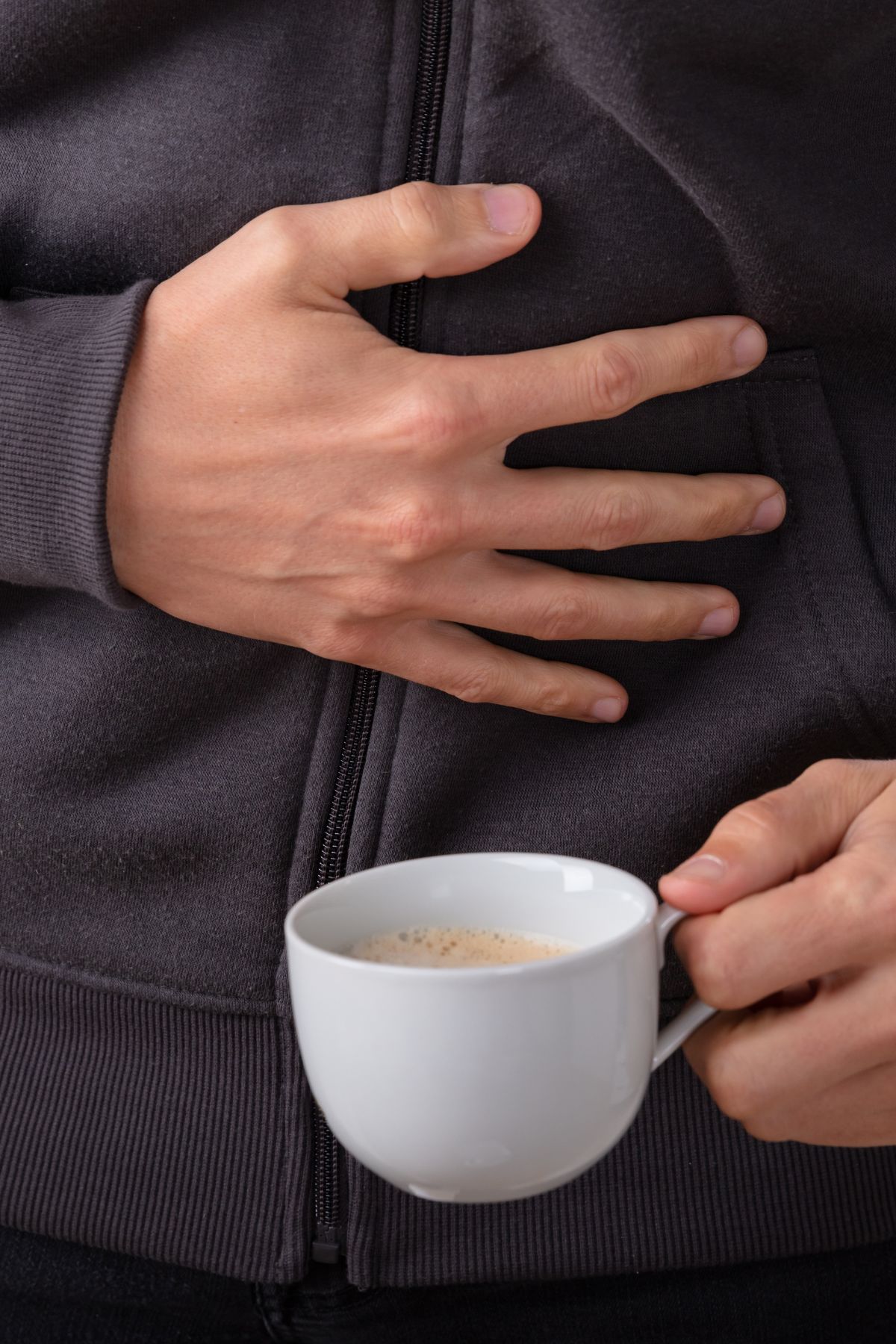Does Coffee Cause Gas & Bloating (And How To Help)?
Are you experiencing gastrointestinal distress after drinking coffee? Find out if coffee can cause gas and bloating, plus some natural tips for how to reduce any discomfort.

Why Do We Get Bloated?
A build-up of gases in the stomach or digestive tract can lead to bloating – a sensation of tightness, fullness, and often pain in the abdomen.
There are all sorts of potential causes, some hormonal in nature and others connected to the digestive system. Occasional bloating is pretty normal, but if you experience it regularly it can be distressing.
Many people find that coffee can be particularly problematic in terms of causing an upset stomach, abdominal pain, IBS symptoms, or digestive issues.
How Coffee Can Cause Gas & Bloating
It’s an established fact that – for some people – coffee acts like a mild laxative, triggering a build-up of gases and a distended abdomen.
But, the exact cause varies from person to person since people react to the different compounds in coffee in different ways.
Let’s review some of the reasons why coffee might cause digestive distress including excess gas production.
Coffee acids
Acidic foods and beverages are known to cause bloating for those with sensitive stomachs.
With an average pH value of around 4.85 to 5.10, most kinds of coffee are acidic. They can contain up to nine different acids, which are released during the brewing process. The degree of acidity in your prepared cup of coffee is affected by several different things.
One is the type of brewing method used, with researchers finding that cold-brewed coffee is lower in acid than hot coffee. The brewing time plays a part, too, and experts have found that the shorter the brewing time, the more acidic the drink.
Levels of acidity are also dependent on the size of the coffee grounds. Because of their larger exposed surface area, the brewing process will extract more acid from very fine grounds.
The final factor is how the beans are roasted, with studies showing lower acidity levels in coffee beans that were roasted at higher temperatures for longer periods of time.
See my list of the best low acid coffees.
Caffeine
Some people who experience gas and bloating after drinking coffee are not reacting to the acids in the coffee beans. Instead, they are sensitive to the caffeine content in coffee.
Caffeine is a stimulant, found naturally in the leaves and fruits of certain plants, including coffee. It is known to increase the production of acid in the stomach and stimulate colonic motor activity (the contractions in the intestines that move waste products through the digestive system prior to bowel movements).
For people sensitive to caffeine, this can cause abdominal discomfort including bloating.
You can test this theory for yourself by either switching to decaf coffee and seeing if you still have an issue, or trying a mildly-caffeinated drink like green tea to see if you still feel bloated.
Lactose intolerance
If you enjoy your coffee with milk or cream, then you may be reacting to the lactose they contain rather than the coffee!
Lactose intolerance or sensitivity can make it hard to digest lactose, a type of sugar found in milk and other dairy products. It’s caused by your body not producing enough lactase – the enzyme that’s needed to digest lactose.
If you’re affected by it, you usually begin experiencing symptoms like gas and bloating within a few hours of drinking coffee prepared with milk or cream. If this is the case, try drinking black coffee to see if your symptoms resolve.
Artificial sweeteners
While there has been little research into the problem, many people who are prone to bloating will tell you that artificial sweeteners like aspartame and sorbitol are a common cause.
These – and other sweeteners – can be hard to digest, leading to abdominal discomfort.
If you use artificial sweeteners in your coffee, you might want to work on reducing the amount you use or limiting the number of cups of coffee you consume in a day.
FODMAPs
FODMAP is an acronym standing for fermentable oligosaccharides, disaccharides, monosaccharides, and polyols – sugars that some people have trouble digesting properly. People sensitive to FODMAPS have to avoid the foods containing them as much as possible.
Some types of coffee – like decaffeinated espresso and regular black – are considered to be low-FODMAP drinks. But once regular milk or certain creamers are added, coffee becomes a high FODMAP beverage and one that can cause discomfort to sensitive individuals.
Examples of low-FODMAP creamers include lactose-free milk and almond milk. Certain sugars are also considered high FODMAP foods, so if you like your coffee sweet, then you might want to look for a low FODMAP sweetener.
Quantity consumed
If you drink a lot of coffee, then it may be the sheer volume of liquid that’s responsible for your discomfort.
Indeed, a study in 2001 found that coffee causes the stomach to enlarge more than an equivalent volume of water, potentially leading to that uncomfortably-full feeling.
Tips to Reduce Gas and Bloating From Coffee
Now that we’ve reviewed how coffee consumption may lead to a laxative effect or bloating in coffee drinkers, let’s review some tips to help you enjoy your morning cup without the negative effects of coffee.
1. Limit your coffee intake
Persistent bloating and gas can make life a misery, so you may need to drink less coffee or cut it out altogether in order to feel better.
If caffeine isn’t your problem, you could try replacing some or all of your coffee with another caffeinated drink like cocoa or tea. Or you could try chicory herbal coffee or mushroom coffee which is naturally caffeine-free and may even improve your digestive health!
If you don’t want to give up coffee completely, at least consider alternating it with a coffee-like beverage that’s kinder to your digestive system.
2. Choose low-acid coffee
The lower the acidity level of your coffee, the less likely you are to experience symptoms such as acid reflux.
As mentioned earlier, cold brew coffee tends to be lower in acid. You can also look for brands that are marketed as having low acidity levels. See my list of the best low-acid coffee at Starbucks.
Avoid light roasts, which are higher in acid than beans that have been roasted at high temperatures for a long period of time – and choose a coarse grind over a fine one.
3. Use lactose-free milk or cream
If your problems seem to stem from the milk or cream added to your coffee, look for lactose-free alternatives.
In order to make lactose-free milk, manufacturers add the enzyme lactase to regular cow’s milk. This means that the end result is very similar to regular milk in terms of texture and nutrients. The only difference is in the taste, which is slightly sweeter.
Other lactose-free creamers include oat, soy, coconut, and almond milk.
4. Try decaf coffee
Decaf – short for decaffeinated coffee – is well worth a try if you love your daily cup of joe but are sensitive to the caffeine in regular coffee.
At least 97% of the caffeine is removed from coffee beans in order to produce decaffeinated coffee, but in every other way, the nutritional profile is virtually identical. Depending on the method used for decaffeination, the taste may be somewhat milder – a bonus for people who find regular coffee a little bitter – and the color might be slightly different, too.
Try to choose the Swiss water process method when choosing your decaf coffee brands.
5. Experiment with different brewing methods
As mentioned earlier, cold brew coffee is lower in acid and generally kinder on your stomach, with French press coffee being another good option.
You can then ensure the acid levels are as low as possible, by increasing the temperature of the water and allowing the coffee to brew for longer.
Coffee & Gas FAQs
The answer to this question is different for everyone. Some people have no trouble with the acidity in coffee but are sensitive to caffeine. For others, the reverse may be true. And for some people, a combination of the two factors may be the problem.
For that reason, it’s a good idea to experiment with different brewing methods and to try both caffeinated and decaffeinated varieties. You may also need to reduce your coffee consumption if you have health issues like irritable bowel syndrome, caffeine sensitivity, or gut health issues.
Although decaffeinated coffee might be the answer for some people, it may still cause gas and bloating in others. It really depends on whether the caffeine was the problem, or other causes such as acidity, artificial sweeteners, or a sensitivity to lactose.
If you decide to try decaffeinated coffee, make the transition gradually – especially if you currently consume lots of regular coffee on a daily basis. Cutting out caffeine too abruptly can lead to uncomfortable withdrawal symptoms like headaches, drowsiness, irritability, and difficulty concentrating.
Yes, it can.This is because cold brew coffee has been proven to have a lower acidity level, so it is less likely to cause digestive discomfort.
Aside from the coffee preparation tips and techniques already described, there are several ways in which you can reduce the gas and bloating it may cause.
Ensure your diet contains lots of gut-friendly foods to improve your overall digestion. Good examples are high-fiber foods (like fruits, veggies, grains, and legumes) and fermented foods rich in natural probiotics (including sauerkraut, kimchi, and kefir).
Alternate your cups of coffee with drinks that help promote good digestion, such as peppermint or ginger tea.
Try peppermint capsules, which help relax the intestinal muscles and allow gas to move through the digestive system effectively.
Make sure you drink plenty of water and avoid carbonated drinks, which contain gases that worsen the symptoms of bloating.
Exercise gently, but regularly. Movement is important for your digestive system and helps prevent the uncomfortable build-up of gases.
There is no scientific evidence to demonstrate a link between drinking coffee on an empty stomach and subsequent problems with gas and bloating. But many people who experience these issues feel that their symptoms are worse if they drink their first coffee before – not after – their breakfast! And there does seem to be some logic in this – after all, coffee is known to increase the production of stomach acid and without any food to protect the stomach lining, it may cause irritation. So it’s worth experimenting to see if drinking coffee after food helps prevent your symptoms from occurring.
More Helpful Coffee Resources You Might Like
Conclusions
If coffee causes you gas and bloating, then there are some methods to prevent these symptoms. From using a low-acid coffee to avoiding milk that may cause lactose intolerance, you may find relief. This article shares some practical ways to drink your morning cup of coffee with more comfort.
Don’t forget to join my newsletter list to get exclusive clean eating recipes and tips. The newsletter is 100% free with no spam; unsubscribe anytime.
About the Author: Carrie Forrest has a master’s degree in public health with a specialty in nutrition and is a certified holistic nutritionist. She is a top wellness and food blogger with over 5 million annual visitors to her site. Carrie has an incredible story of recovery from chronic illness and is passionate about helping other women transform their health. Send her a message through her contact form.
Note: this post is for informational purposes only and is not intended as medical advice. Please consult your healthcare provider for recommendations related to your individual situation.




















